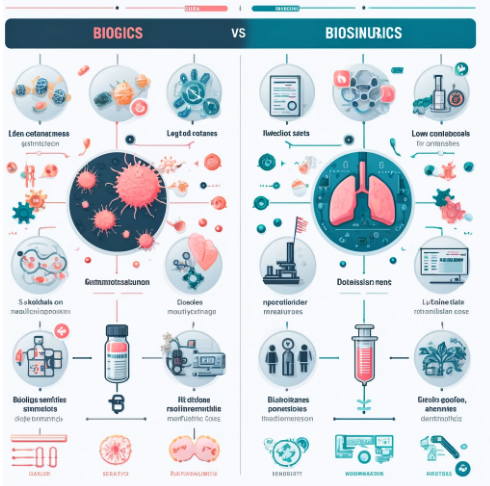Introduction
The rising costs of biologic drugs, which are used to treat various chronic diseases like rheumatoid arthritis, cancer, and inflammatory bowel disease, have led to the development of biosimilars. These drugs are designed to be highly similar to already-approved biologic medicines, offering the same therapeutic benefits at a reduced cost. In this article, we will explore what biosimilars are, how they differ from biologics, their regulatory approval process, and the impact they are having on healthcare systems around the world.
What Are Biosimilars?
Biosimilars are medications that are nearly identical copies of biologic drugs, which are made from living organisms. Unlike generic drugs that are exact chemical copies of their brand-name counterparts, biosimilars are only “similar” due to the complexity of biologics. Biologics are large, complex molecules derived from living cells, making them more challenging to replicate. However, biosimilars match the reference biologic in terms of safety, efficacy, and quality, making them a viable alternative.
Key Differences Between Biosimilars and Biologics
- Manufacturing Process: Biologics are produced using living cells, and even slight differences in manufacturing processes can lead to variations in the final product. Biosimilars are made using the same complex biological processes, but they are not exact replicas due to the inherent variability of biological materials.
- Approval Process: While biologics undergo rigorous testing as new drugs, biosimilars go through an abbreviated approval process. Regulatory agencies like the U.S. Food and Drug Administration (FDA) and the European Medicines Agency (EMA) require biosimilars to demonstrate that they are highly similar to their reference biologic, with no clinically meaningful differences in safety and efficacy.
- Interchangeability: Not all biosimilars are interchangeable with their reference biologics. In many regions, regulators require additional studies to prove that switching between the biologic and the biosimilar does not affect patient outcomes.
The Role of Biosimilars in Healthcare
Biosimilars are playing an increasingly important role in reducing healthcare costs, particularly in treating chronic diseases that require long-term medication. Some of the areas where biosimilars are making an impact include:
- Rheumatoid Arthritis and Inflammatory Diseases: Biologics like Adalimumab (Humira) and Infliximab (Remicade) are commonly used to treat autoimmune diseases. Biosimilars for these drugs offer the same treatment outcomes at a fraction of the cost, providing relief to healthcare systems burdened by the high price of biologics.
- Cancer: Monoclonal antibodies such as Trastuzumab (Herceptin), used in treating breast cancer, have biosimilar versions that have dramatically reduced the cost of cancer treatment in many countries. With cancer being one of the most expensive diseases to treat, biosimilars provide a more affordable option for patients and healthcare providers.
- Diabetes: Biosimilars for insulin, such as Insulin Glargine, are offering cost-effective alternatives to branded insulin products, benefiting diabetic patients who rely on daily treatments.
Benefits of Biosimilars
- Cost Savings: One of the most significant advantages of biosimilars is the potential for cost savings. As biosimilars become more widely available, the competition they introduce is expected to drive down the prices of both biologics and biosimilars. Studies have shown that biosimilars can be up to 30% cheaper than their reference biologics.
- Improved Access: With lower costs, biosimilars can make life-saving treatments more accessible to patients in need. This is particularly important in low- and middle-income countries, where the high price of biologics often limits treatment options.
- Encouraging Innovation: The development of biosimilars promotes innovation within the pharmaceutical industry by pushing companies to improve manufacturing processes and efficiency. This competition can lead to advancements in the production of both biologics and biosimilars.
Challenges and Barriers to Adoption
Despite the many benefits, the adoption of biosimilars has faced several challenges:
- Physician Reluctance: Some healthcare providers are hesitant to prescribe biosimilars due to concerns about their efficacy and safety. Additionally, since biosimilars are not exact copies of biologics, there is apprehension about switching patients from biologics to biosimilars, especially in cases where a biologic has been effective for a long period.
- Patient Perception: Patients may also be resistant to switching to biosimilars, especially if they are unaware of the similarities between the two types of drugs. Education and awareness programs are necessary to build trust in biosimilars as a safe and effective alternative.
- Regulatory and Patent Hurdles: In some cases, patent disputes and regulatory hurdles delay the introduction of biosimilars into the market, preventing patients from accessing cheaper alternatives.
Recent Advances and Future Prospects
The future of biosimilars looks promising as more products are being approved for use in various therapeutic areas. With advancements in biotechnology and manufacturing, the production of biosimilars is expected to become more efficient, leading to broader availability. As regulatory frameworks continue to evolve, there will likely be an increase in the number of biosimilars entering the market, driving further competition and reducing costs for patients.
Conclusion
Biosimilars represent a significant advancement in modern medicine, offering a cost-effective alternative to expensive biologics without compromising on safety or efficacy. As more biosimilars become available, patients and healthcare systems stand to benefit from reduced costs and improved access to essential treatments. Although challenges remain, the growing acceptance of biosimilars signals a shift towards more sustainable and affordable healthcare.
References:
- Blackstone, E. A., & Fuhr, J. P. (2013). The Economics of Biosimilars. American Health & Drug Benefits.
- Weise, M., Kurki, P., Wolff-Holz, E., Bielsky, M. C., & Schneider, C. K. (2014). Biosimilars: the science of extrapolation. Blood.

